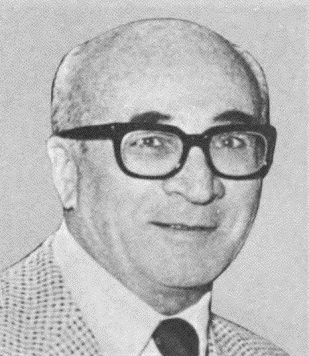
Teno Roncalio
Teno Domenico Roncalio (born Celeste Domenico Roncaglio; March 23, 1916 – March 30, 2003), was an American politician and writer who served in the United States House of Representatives. To date, he is the last Democrat to have represented Wyoming in the House of Representatives.[1]
Teno Roncalio
William Henry Harrison
March 30, 2003 (aged 87)
Cheyenne, Wyoming, U.S.
Cecilia Waters Domenico
6
- Frank Roncalio (father)
- Ernesta Roncalio (mother)
1942–1945
During the 1950s and 1960s, Roncalio served in multiple positions within the Wyoming Democratic Party. He was elected to the House of Representatives in 1964, and served until he unsuccessfully ran for the United States Senate in 1966. Roncalio was elected to the House of Representatives in 1970, and served until he announced that he would not seek reelection in 1978.
Roncalio held positions in environmental committees during John F. Kennedy's administration and in the 1980s. During his tenure in the House of Representatives, he supported multiple environmental bills and was a staunch opponent of American involvement in the Vietnam War. After leaving the House of Representatives he remained active in politics and helped some of the remaining successful campaigns of the Wyoming Democratic Party before his death.
Early life[edit]
Celeste Domenico Roncaglio was born on March 23, 1916, in Rock Springs, Wyoming, to Frank and Ernesta Roncalio, Italians who had immigrated to the United States in 1903.[2] His family later removed the G in their last name; he was known by the diminutive "Celestino", so was given the nickname "Tino" as a child, which later became Teno.[3] In 1933, he earned his barber's license and after high school he worked as a reporter for the Rock Springs Rocket-Miner.[4] He enlisted into the army following Pearl Harbor and during World War II he fought at the Battle of Gela and was later awarded a Silver Star for gallantry in the Normandy invasion on Omaha Beach. In 1945, he was discharged from the army with the rank of captain.[5]
In 1940, he started editing the Wyoming Collegiate features which were published by the Casper Tribune-Herald newspaper.[6] While in college, he was elected as president of the student body, joined the Young Democrats, and Senator Joseph C. O'Mahoney offered him a job in Washington, D.C.[7] In 1947, he graduated from the University of Wyoming with a law degree.[8]
Career[edit]
Politics[edit]
In 1950, he began working as editor of the Wyoming Labor Journal. He served as the prosecuting attorney for Laramie County from 1950 to 1956. In 1957, he was elected as chairman of the Wyoming Democratic Party. Later that year Governor Milward Simpson proposed a civil rights bill that Roncalio had drafted after seeing a black couple being removed from a restaurant.[9] He also served as a delegate to the 1956, 1960, 1964, and 1968 Democratic National Conventions. In 1958, it was speculated that he might be a possible Attorney General appointee, but on December 3, 1958, he stated that he did not want to be appointed to the office.[10]
As Chairman of the Wyoming delegation to the 1960 Convention, he cast the fifteen votes which gave John F. Kennedy the minimum amount needed to win the Democratic presidential nomination.[11] Following Senator-elect Edwin Keith Thomson's death Kennedy asked Governor John J. Hickey to appoint Roncalio to fill the Senate vacancy, but he chose to instead appoint himself.[12] Kennedy later appointed him as chairman of the International Joint Commission on Water Rights between the United States and Canada in 1961 and served until 1964.[13]
Later life[edit]
He returned to Wyoming, where he served as Special Master in Wyoming's Big Horn adjudication of Indian Water Rights until 1982. In 1980, he endorsed Jim Rogers' house campaign, but Rogers was defeated in a landslide by Dick Cheney. In 1982, he endorsed Rodger McDaniel's unsuccessful U.S. Senate campaign.[45][46] In 1986, his wife served as co-chair of Kathy Karpan's successful Secretary of State campaign and in 1990, he donated $1,000 to Pete Maxfield's unsuccessful House campaign against Craig L. Thomas.[47][48]
In 1980, he explored for gold around Snake River in Teton county.[49] In 2002, the post office in Rock Springs, Wyoming was named in his honor.[50] On March 30, 2003, Roncalio died of congestive heart failure at the Life Care Center in Cheyenne, Wyoming and was buried in Mount Olivet Cemetery. Governor Dave Freudenthal, former Governor Mike Sullivan, Senator Craig L. Thomas, State Chief Justice William U. Hill, former Secretary of State Kathy Karpan, and other Wyoming political figures attended his funeral and a letter from Senator Ted Kennedy was read at the funeral.[51]
Political positions[edit]
Domestic[edit]
In 1965, he introduced legislation to extend the National Wool Act of 1954 through December 1972 in the House alongside Senator Gale McGee who introduced it in the Senate.[52] In 1965, he introduced a bill that would have repealed Section 14B of the Taft–Hartley Act that prevents unions from negotiating contracts or legally binding documents requiring companies to fire workers who refuse to join the union, but it failed.[53] In 1966, he proposed that every window on commercial airplanes should be turned into emergency exits and attempted to have the Federal Aviation Agency support his idea, but he was unsuccessful.[54]
In July 1974, he voted for an amendment that would prevent the use of federal funds for abortions, but it was defeated with two hundred forty seven against and one hundred twenty three in favor.[55]